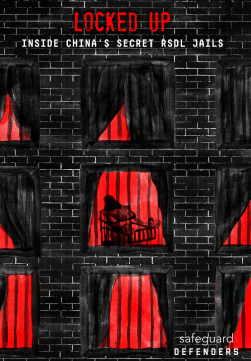
A two-day business trip to became a four-year trap for Taiwanese businessman Morrison Lee. Safeguard Defenders tells the unsettling, yet not surprising story of how Lee was arrested in 2019 for having pro-Hong Kong, anti-Extradition-Bill postcards. After more than two months being held incommunicado, Lee was charged and pled guilty to a different offense of having taken pictures of military vehicles that had been parked near his hotel.
the police were looking to charge him with splittism and then incitement to subversion of the state, both based on the postcards. But the prosecutors rejected both because of insufficient evidence. Finally, the police switched tactics, and charged him with “spying and illegally providing state secrets to foreign entities” based on the photos of the military vehicles – freely visible to anyone in that area – that they found on his phone and saw that he had sent by line to friends in Taiwan.
“Be careful taking photos in China or you may end up in secret jail”. Safeguard Defenders. Nov 1, 2023.
Lee was subjected to the various layers of the Chinese “justice” system. It started by being subjected to “RDSL”, Residential Surveillance at a Designated Location, where he was held incommunicado for over 2 months in a hotel room. In this type of jail, which some might more accurately name as “kidnapping”, he was watched over constantly and routinely interrogated.
Safeguard Defenders has a report on the RDSL system (PDF format).

Once they had decided to actually charge him, Lee was moved from RSDL to a more traditional jail. But, the political crime of supporting Hong Kong protesters could not be sustained based on the postcards, so they came up with the alternative crime of taking photos of military vehicles. Apparently, the presence of these military vehicles in Shenzhen (nearby to Hong Kong) amounted to “state secrets”.
On top of this arbitrary detention and the willingness of the Chinese prosecutors to go rummaging for a charge, his lawyer wasn’t much help:
the lawyer did not have much power to help him. “I felt that the only use of that lawyer was to help me communicate with my family, he did not defend me at all. He just asked me to plead guilty… he said that way I would get a shorter sentence; it’s the only way he could help me.”
And even upon serving his year-and-a-half sentence, he was informed that he would still be stuck in China for an additional two years:
“An officer told me I had to serve an additional two years Deprivation of Political Rights, which included an exit ban. I was very shocked. Nobody, including my lawyer, had warned me about this.”
Lee was shocked by this additional encumbrance of being unable to leave China even after he was done serving his time. But, it is not shocking, sadly. In China’s way of doing things, “justice” is another domain where the political will of the CCP is exercised. The Chinazi political will is not accountable to concepts of actual justice in process or outcome. Lee was just one more victim.
One might say that Lee’s final two years were served in the larger, country-sized prison aka the People’s Republic of China.





